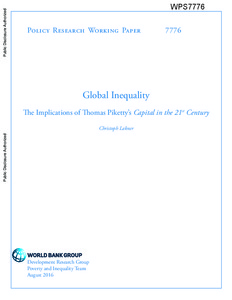The implications of Thomas Piketty's 'capital in the 21st century

World Bank - Washington, DC
2016
21 p.
capitalism ; income distribution ; social inequality
Policy Research Working Paper
7776
Social sciences
English
Bibliogr.
"In the 2000s, global inequality fell for the first time since the Industrial Revolution, driven by a decline in the dispersion of average incomes across countries. Between 1988 and 2008, a period of rapidly increasing global integration, income growth was largest for the global top 1 percent and for country-deciles in Asia, often in the upper halves of the national distributions, while the poorer deciles in rich countries lagged behind. Although within-country inequality increased in population-weighted terms, for the average developing country the rise in inequality slowed down in the second half of the 2000s. However, like any analysis based on household surveys, these results could miss important increases in inequality if they are concentrated at the top. These data constraints remain especially serious in developing countries where only very limited information on the top tail exists, especially regarding capital incomes."
Digital
The ETUI is co-funded by the European Union. Views and opinions expressed are however those of the author(s) only and do not necessarily reflect those of the European Union or the ETUI.